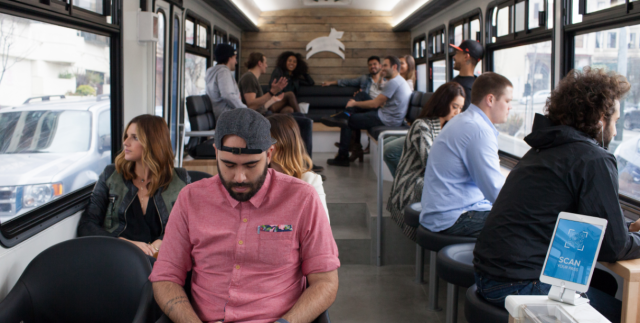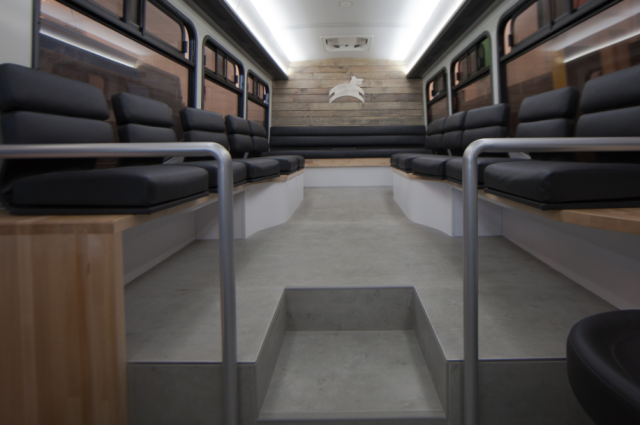The startup service has no room for people with mobility issues. Why do tech companies always get away with everything?

By Tim Redmond
APRIL 7, 2015 – The launch of Leap, the private $6-a-ride bus service, got press attention that would seem far out of proportion to its fairly modest program. Right now, the upscale buses only run on one route, through the Marina to Downtown.
But just as Uber and Lyft have upended the taxi industry, Leap has the potential to take riders away from Muni – particularly if it expands to more neighborhoods and attracts the more upscale people who now take the bus to work.
If that happens, of course, Muni would become a second-class service for those who can’t afford the fancy buses – and when the middle class stops using public transit, public transit stops getting the political support it needs to continue serving the city.
Beyond the generally glorious reviews so far (including a plug from BART Board member Nick Josefowitz), there’s a side of Leap that’s been almost entirely ignored.
The company’s website says that “everybody can ride” – which apparently means you can get a ticket by smartphone or by printing one out at home. But “everyone,” some advocates complain, doesn’t include people with disabilities.
There are no wheelchair ramps on the Leap buses. If you show up at one of the stops in a wheelchair, “you are just out of luck,” Bob Planthold, a longtime disability-rights activist, told me.

Take a look at the nice pictures of the pretty interiors – and then imagine you have mobility issues. Those nice seats in the back? They require climbing a step and negotiating a fairly narrow aisle.
It’s a similar situation to Uber and Lyft, which got permission to act as taxis without having to follow the same rules as taxi companies, which are required to provide service to people in wheelchairs. Airbnb is allowed to operate what amount to hotel rooms without any mandated Americans with Disabilities Act access.
“I don’t understand how you can get away with noncompliance with the ADA,” Planthold told me. “As a business, they are required to comply with all the employment laws and workplace-safety rules.”
The head of Leap says the company is trying. When I asked for comment, Kyle Kirchhoff, the CEO, sent this:
Our vision is for Leap to be accessible to anyone who wants to use our service. We currently operate four buses purchased from public transit agencies. The vehicles as-designed were not set up for wheelchair access, but we have been actively working on ways to bring accessibility to our route. We’re exploring new design solutions and vehicle types to be able to add this to Leap as we expand our fleet.
The interesting thing: Leap’s press kit points out that the buses were completely gutted and redone:
The entire bus has been redesigned to create a comfortable space for commuters. Three unique seating areas include a social perimeter for chatting with neighbors, spacious front-facing seats for reading a book or catching up on a podcast, and a laptop bar for getting a jump start on work. Each bus features Wi-Fi, USB ports for powering devices, and buy-on-board snack service featuring some of San Francisco’s finest brands.
Tearing out all the seats and designing a new interior isn’t a small task, and a lot of thought must have gone into it. Just no thought about how it would work for people in wheelchairs.
That, Planthold told me, is “a real attitudinal neglect. It shows how nonobservant people are about the world around them. There’s a real lack of understanding about civil rights.”
Also interesting: The ADA passed in 1990, and all municipal buses built in the US after that date needed to be accessible. So either Leap bought older buses, or bought buses from another country, or …. or what?
I realize this is a new company with just a few buses – although if just one had a wheelchair lift, I think it would have gone a long way to address the disability-rights community’s concerns. But Leap isn’t alone – the entire tech startup culture involves services for people just like the ones who work in startups – young, healthy, active, able to get around easily.
And that’s where a lack of government oversight and regulation has created problems. There are reasons that companies offering public services and accommodations (hotels, taxis, airplanes) are required to provide services for disabled people. When my 91-year-old mother got on an airplane in a small upstate New York airport last summer – a place way too tiny for jetways — they took away the stairs after everyone else had boarded and pulled up a special ramp just for her, and an attendant helped push her wheelchair to the plane. Otherwise, she wouldn’t have been able to travel – and it’s not fair for someone who is old and has bad legs to be told she can’t fly.
It’s also the law, and the airlines all know it.
But tech startups don’t seem to worry about these things. Leap launched its service before it had formal approval from the California Public Utilities Commission, the same way Uber started without a license to run cabs and the Google buses started parking in Muni stops without permission.
Not to pick on Leap, but at some point the regulators are going to have to make clear that there are rules for everyone, and having a killer app and some venture capital funding doesn’t protect you.




